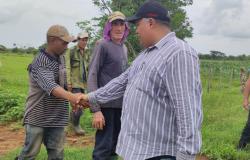Older adults in Cuba. (File image/RHC)
By Pedro M. Otero Cabañas
Population aging is today a common denominator in almost all countries in the world and it is considered that it will increasingly influence the design of labor, cultural and social policies of each nation.
The UN assures that the number of people over 65 years of age is growing faster than that of any other population segment.
According to the source, it is expected that the percentage of the world’s population over 65 years of age will increase from 10%, in 2022, to 16% in 2050. In this last year, the number of older adults will be double the number of children under 5 years and almost equivalent to that of children under 12 years of age.
By 2030 in Latin America and the Caribbean, those over 65 years of age will reach almost 20 percent, according to ECLAC.
The oldest countries in the region are Uruguay, Cuba and Argentina, with percentages that fluctuate between 13 and 20 of the total inhabitants.
The Cuban Ministry of Public Health states that in 1907 the Cuban population aged 60 and over was only 4.6%. In less than 50 years this group quadrupled. By 1982 it exceeded 11% of the total population.
Today – according to the same source – there are more than 2 million older adults in Cuba and they constitute 20.4%. It is estimated that between 2025 and 2030 this age group will exceed three million and will represent more than 30% of the population.
The World Health Organization states that “healthy aging is the process of promoting and maintaining the functional capacity that allows well-being at this stage of life.”
In this sense, Cuba works to care for its older adults by applying policies that support and protect them, in the midst of perhaps the most critical moment in its history, characterized by a sustained US economic war, which causes shortages of food, medicine, inputs of all kinds and a poor energy system responsible for frequent and prolonged blackouts.
In an interview with the PL news agency, the vice head of the National Statistics Office, Juan Carlos Alfonso, described the aging of the Cuban population as “the country’s greatest challenge in the demographic field, due to its consequences and impact in all spheres. : economic, social, cultural, educational and even environmental and for the entire society”
He declared that the policy of attention to Cuban demographic dynamics encompasses four primary objectives: the first is aimed at encouraging each family, each woman, to have the desired children, at the time they decide.
The second objective – he added – is linked to care for the elderly and the third, to employment; to promote that everyone who can work does so, including older people because Cuba needs that strength and experience.
A fourth purpose focuses attention on the immigration issue: fundamental within the demographic dynamics in Cuba and covers both leaving the country and internal mobility, he stated.
Turning my gaze again to the UN on this topic and to conclude, I reply with an important statement:
“Population aging is about to become one of the most significant social transformations of the 21st century, with consequences for almost all sectors of society, including the labor and financial markets, the demand for goods and services, such as housing, transportation and social protection, as well as family structure and intergenerational ties.”






